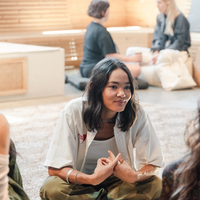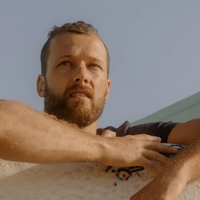Has late-night social media doomscrolling ever been a good idea? In an attempt to zoom in on your ex’s pic with his new girlfriend, you accidentally double-tap the photo. A picture of your frenemy on the pristine beaches of Turks and Caicos irritates the heck out of you. Your rage boils over when you find out that this same frenemy is now a cryptocurrency billionaire. You posted a gray sweatpants selfie two days ago and not a single person left an eggplant emoji in the comments. On top of all of that, violence against marginalized people is documented and shared endlessly, triggering heated emotions and compassion fatigue.
“OK, enough,” you finally tell yourself. You peel your cramped fingers off of the phone and promise to leave it on your nightstand. Exhausted and emotionally drained, your body still feels restless and you can’t get any sleep. You try counting sheep. “One sheep, two sheep, three … so when did she find the time to invest in Bitcoin, though? She was such a hot mess in college.” Your body begs you to keep counting the sheep. Look how fluffy they are! Let’s focus on sheep, not Bitcoin! Come on, dude, we were so close to catching Zzzs! But your phone is right there and you just absolutely need to know when that person you dislike decided to do something you’ve never even cared about in the first place.
Sleep? Or a few more minutes of snooping on Instagram? Which would you pick?
Social Media Use Can Negatively Impact Sleep
Researchers have conducted many studies in the last decade to investigate the effects of social media on sleep and mental health, especially in adolescents whose physical and emotional growth can be seriously stunted by unhealthy emotional dependence to these apps. A 2016 study found that social media is associated with poor sleep, anxiety, depression and poor self-esteem, while a 2018 study found that social media negatively impacts sleep habits of young girls more than young boys.
A study conducted amongst 197 American undergraduate students suggests that the emotions created by social media use can cause us to lose sleep, too. Alongside her research team, psychotherapist and UC Los Angeles lecturer Renee Garett, LCSW, found that fear-based social media posts were associated with poor sleep quality.
“Social media can trigger any emotion because it’s a reflection of someone’s emotional state at the time,” Garett tells Trends w/ Benefits. “Oftentimes, people use social media when they are triggered by something.”
She also points out that people share more about hot-button issues than they share mundane content. And to her point, even when we do see mundane content on social media, we typically ignore or minimize it. Damn, Carl. You baked another sourdough loaf? Wow, Marcia. How many more plants can your apartment hold, fam?
What’s at the Root of Social Media Addiction?
Whether you’re posting redundant plant photos or political hot takes, your need to be heard is 100 percent valid. “People by nature want to be heard and understood by other people, and social media has become the new town square where people can engage about their strongest opinions with many, many people in a short period of time,” says Garett.
Our social media use might be rooted in the very simple need to be heard and validated, but the emotional roller coaster it entails can become addictive.
Garett encourages us to treat social media addiction with the same seriousness with which we would treat substance, sex, gambling or food addictions. Excessive and compulsive social media use can trigger a surge of the pleasure neurotransmitter dopamine and, over time, it’s easy to form a problematic dependency. “People will often avoid other responsibilities and activities in order to engage in social media use when they are addicted,” Garett explains. If this is the case, she suggests people discuss the problem with their primary care doctor or seek more information at samhsa.gov.
So how do we begin to create healthy relationships with social media? Garett highly recommends starting with a social media cleanse, during which time you opt for writing in a journal instead of posting online. “Reflect on why you want to do this and what you are trying to seek through social media,” she says.
Often, the time we spend crafting the perfect caption or capturing the best angles are tangled in the need to make our story believable.
Sometimes, we just need to hear a friend say, “Wow. Yeah, that’s really fucked up. I’m so sorry that you’re going through that.” You deserve kindness, compassion and empathy without having to broadcast every waking moment, and without having to curate a believable story. Garett suggests identifying alternative activities that can give you the same feeling or experience of being on social media. You can organize an outdoor group hang, throw a Netflix party where you and your friends can chat about the same movie, or simply call a friend.
It’s understandable to be haunted by FOMO after a few days off of social media. What corrupt companies are we boycotting this week!? Did that friend of a friend of a friend birth their breech baby safely?! I wanna congratulate my cousin from Tennessee on graduating top of their class, and texting them seems too intimate! Toxic dependence on social media alone for joy, connection and validation is an issue, but sometimes our motives are pure.
Tips for Healthier Social Media Habits
Here are a few tricks to help build a healthier relationship with social media, and protect precious sleep in the process:
- Aim for two screen-free hours before bed. Nighttime screen use can affect the body’s melatonin production. Melatonin is a sleep-regulating hormone, so it can be pretty difficult to sleep if social media use at night keeps disrupting melatonin production. Try leaving your phone in a different room, or in a closet, while sleeping. Invest in an old-school alarm clock to wake up.
- Use an app that times your social media use. On Apple devices, you can set limits for the amount of time you spend on apps. Take advantage of that feature so that you can spend more time doing the things you love. Other apps are available for Android and Google devices to help you manage your time wisely.
- Unfollow people who make you jealous. No judgments at all if you end up following only two people. Try to bulk up your newsfeed with content that makes you happy—perhaps some skateboarding bulldogs and CleanTok channels with intensely satisfying before-and-after results.
- Implement deep-breathing exercises while scrolling through triggering information. Reading news about the colonization of Palestine, updates on the Black Lives Matter movement and back-to-back reports about horrible work conditions for essential workers during the pandemic can be draining, but our participation is necessary for things to change. When reading content that’s stressful, triggering and downright enraging, take a second to pause. Breathe deeply through the nose. Relax your furrowed brow. Unclench your jaw. Stretch and release tension from your neck and shoulders. Move slowly and mindfully through the content so that you can focus on finding solutions.
Cultivating a healthy relationship with social media is possible, and it can feel as freeing as taking a pair of jeans off after your first post-vaccine hang with friends. A healthy relationship with social media will look different for everyone, but for the most part there’s one common thread: We should be able to step away from social media when we need to focus on more important things, like getting a full eight hours of uninterrupted, restorative sleep.
Leo Aquino (they/he) is a storyteller living in Los Angeles. They write stories about relationships, sexual wellness and culture. Follow them on Instagram @leo_nas_x.




